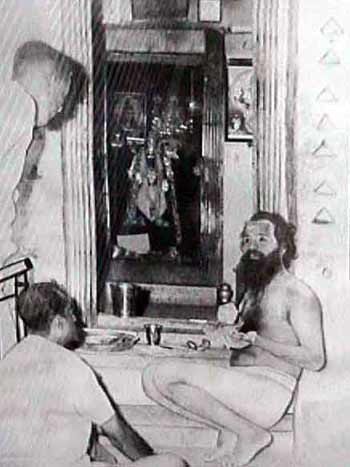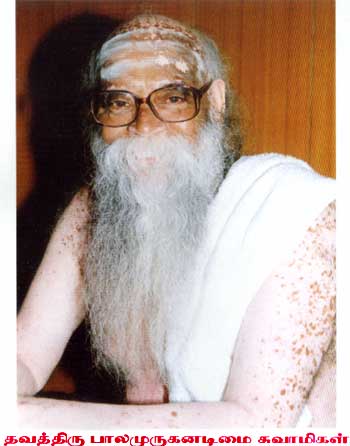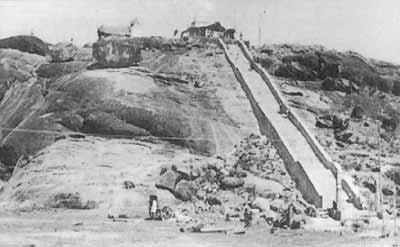What One Man’s Dedication Wrought
by Kesava Mallia, Chennai
March 20, 1968: It was a dark day indeed for the priest at the Ratnagiri Hill Temple, located between Vellore and Arcot about a hundred miles from Chennai. Three months had gone by since he was last paid, and his patience was running out. “How much longer must this go on?” he thought to himself. He was in a particularly sour mood this morning and decided to not perform his obligatory daily worship service in the main shrine of the temple.
About this time, Satchidanandam–a 27-year-old clerk–strolled into the temple for his usual morning worship. When he saw the condition of the main shrine, he was shocked. Not only were the lamps and incense not lit, but also fresh flowers and sacraments had not been gathered and prepared. Nor had the puja implements been cleaned and set out.

“Where is the priest?” he thought to himself. “Why is he not performing the morning puja?” Satchidanandam could not help feeling a special concern for the welfare of this particular temple. His father, Kandaswami Mudaliar, had initiated the construction of the 156 steps leading up to its entrance in 1936 and orchestrated its kumbhabhishekam (major consecration) in 1938.
Although young Satchidanandam was discouraged by what he saw, he still circumambulated the shrine and stood before the Deity to pray. As he began to commune with the shakti that he felt emerging from within the shrine, he fell into a swoon. The experience took him by surprise.
Nothing like this had ever happened to him before. As he leaned against a pillar for support, his body quivered with bliss as his head filled with a golden light. Just as he was about to merge into a sea of oneness, Lord Muruga appeared before him in His etherial body. Although the presence of this legendary God was powerful, He vanished almost as soon as he appeared–like a bolt of lightening.
Slowly, young Satchidanandam settled back into a calm and peaceful physical consciousness. He knew it would take some time to fully digest what had just happened. For now, however, he was aware only of a mighty determination to restore this neglected temple to the state of its original elegance and beauty. At that very moment, the transformed young man took a vow to never leave the Ratnagiri Hill Temple until it had been fully renovated.
Thus began the work that was to be his life’s mission. The residents of the nearby village of Kilminnal stopped calling the young man “Satchidanandam.” Instead, they referred to him as Balamurugan Adimai–or just “Swamiji ” for short.

In the 36 years that have passed since the clerk-turned-holy-man took his vow to do this work, he has not left the temple precincts even once, and his life has been one of exemplary simplicity and austerity. Aside from worshiping and meditating three times daily–at 4:30 in the morning, 12 noon and six in the evening–he remains fully available as a servant of the God that appeared before him during his one unforgettable life-changing experience. Most of his time is spent fully immersed in the supervision of temple construction and the hosting of guests. At 9:00 pm he retires to his room for meditation and sleep. His few personal needs are easily met.
Swamiji is an expert in working with people. He takes special care to become knowledgeable in every aspect of temple construction so that, whether he is talking with sthapatis about stone work or silversmiths about metal crafting, he can negotiate knowledgeably on even the smallest details of their work. He even becomes actively involved with the supervision of photographers and journalists who come regularly to publicize the progress of the on-going renovation.
The neglected Ratnagiri Hill Temple, for which songs were composed and sung by Saint Arunagirinathar in the 14th century, was originally only 200 square feet in size. Today, due to the inspiration and hard work of Balamurugan and the people who help him, it covers more than 30,000 square feet.
Over time Swamiji has also become a spiritual guide and social leader for the residents of Kilminnal. Besides catalyzing their mystical and religious inclinations, he also provides assistance of a more practical sort. So far, he has built a school, a hospital and a number of roads; and provided much-needed water to the area by digging wells and constructing massive tanks for water storage.
It’s no wonder the local people love him and gladly volunteer their time and energy to lift large, heavy granite stones to the hilltop for the temple construction. In 1987, Swamiji began building his school for the youth of the surrounding rural areas by first constructing the Ratnagiri Nursery, which opened with two teachers and 18 students. Through the years that followed, he constructed additional buildings to provide classroom and library space for education in a variety of fields including math, science, language, literature and computer science.
Today, Swamiji’s school campus includes ample kitchen and bathroom facilities, a large conference hall, several libraries and 24 classrooms. It employs 43 teachers and 12 staff members and provides education for 900 students. The hospital, which Swamiji began constructing in 1988, now has 26 staff members and makes medicine available at subsidized rates to local residents. Monthly eye camps sponsored by the hospital provide poor villagers with cataract operations, free of charge. Medical specialists from Chennai visit every Sunday. The Accident Relief Center, aided by State Government and run by the hospital, provides a fully equipped mobile van–the first of its kind in the Vellore district–for emergency outcalls.

The future of Kilminnal and the Ratnagiri Hill Temple look bright as long as 64-year-old Balamurugan Adimai is around. Although one might assume that the continued improvement, maintenance and management of the temple, school and hospital facilities that have already been created might constitute a full-time job, such might not be the case for the ever-vibrant Balamurugan.
If the past provides any indication of what the future might bring–which usually it does–there should be good reason to assume that more dynamic creativity can be expected from Balamur ugan Adimai.
- 1968: Satchidanandam enjoys a vision of Lord Muruga. Local villagers name him “Balamurugan.”
- 1970: Balamurugan begins his service. A well is dug for the temple and nearby village of Kilminnal. The main Ratnagiri mandapam (worship hall) and an entrance Ganesha shrine and mandapam at the base of Ratnagiri Hill are constructed.
- 1973: Two more temple mandapams and a large marriage hall are built. Six staff buildings and eight guest cottages are also constructed.
- 1974: An ornate temple entry arch is erected, and electricity is installed to provide night lighting for the temple.
- 1975: A five-story rajagopuram (main temple tower) is completed. Two 8,000-liter water tanks are installed for use by local residents. A large dining hall and kitchen are built.
- 1978: A post office and police station for Kilminnal are constructed. Ten staff buildings and four guest cottages are added to the temple.
- 1988: The long-term construction of a school for local youth begins. A 25-bed hospital is completed.
- 2003: A separate building for computer training is constructed for the school. Science and library annexes are also added.
Courtesy: Hinduism Today magazine July/August/September 2004